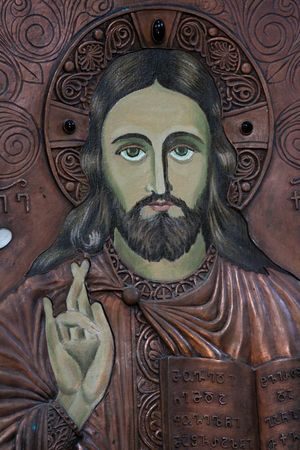
Pastors have a frequent question when they begin to discover mimetic theory. “That’s great. But how does it preach?”
Reverend Tom Truby shows that mimetic theory is a powerful tool that enables pastors to preach the Gospel in a way that is meaningful and refreshing to the modern world. Each Wednesday, Teaching Nonviolent Atonement will highlight Tom and Laura’s sermons as an example of preaching the Gospel through mimetic theory.
In this sermon, Tom goes to the heart of the Gospel by contrasting the way of Caesar with the way of Christ; the way of violent coercion with the way of nonviolent love. Tom writes, “To look at this on a national level, rather than simply personal, every country sets up a national security system to defend itself against its neighbors. In the service of security every nation sends their young people to fight other young people from other nations who are also sent in the service of security. This is just how humans work.” But Jesus shows that humans don’t have to work that way. There is an alternative. We can follow Jesus into the Kingdom of nonviolent love. Tom’s sermon explores how.
Year B, Pentecost 16 (Between September 11 and 17 inclusive)
September 13th, 2015
By Thomas L. Truby
Mark 8:27-38 (Common English Bible, copyright 2011)
A Love You Can’t Escape!
“Jesus and his disciples went into the villages near Caesarea Philippi.” The “where” is significant! They are near Caesarea Philippi, the city named after the most powerful human on earth at that time. It is a place where minds dance with images of Roman force and imposition of will at will. Dreams of God-like power animate the disciples as they picture themselves special agents on God’s swat team. The idea is intoxicating and they will not be able to contain it if it goes too far.
As they walk Jesus asks “Who do people say that I am?” They reply “Some say John the Baptist, others Elijah, and still others one of the prophets.” Everyone is trying to decide who Jesus is and they draw on familiar categories to describe him. John the Baptist was a first century Televangelist-type who had recently been executed by the Rome-empowered governor, Herod. Maybe Jesus was his ghost returned to continue his work. Or maybe Jesus was Elijah, the 9th century BC prophet who did miracles, called down fire from the sky and went to heaven in a whirlwind. The people believed Elijah would return just “before the coming of the great and terrible day of the Lord”, making Jesus the sign of the coming Messiah. These were great and terrible days. Could Jesus be he? Or perhaps Jesus was one of the prophets—poets who painted a vision and sparked human imagination toward the way things ought to be, like our hip-hop artist critiquing conditions for those in the ever-expanding underclass.
Jesus continues “And what about you? Who do you say that I am?” We have come to the heart of Mark’s gospel. A silence descends as each disciple thinks how to respond. Finally Peter answers. “You are the Christ.” Jesus neither confirms nor denies Peter’s assertion. Instead “Jesus ordered them not to tell anyone about him.”
Did you expect that answer? I didn’t. I was expecting a “good for you Peter. You got it right” but instead Jesus imposes a gag order. Why did he do that? Like everyone, they think the Christ, who has just revealed himself to them, will rule the way Caesar rules only with more power because he is from God. Jesus must hold them back for they have totally misunderstood what Jesus is doing and how he will do it. He knows if they talk they will only spread their misconception.
What Jesus says next is totally incomprehensible to them and at the center of Mark’s Good News. Our text says, “Then Jesus began to teach his disciples: ‘The Human One must suffer many things and be rejected by the elders, chief priests, and the legal experts, and be killed, and then, after three days, rise form the dead.’” Mark’s gospel then adds “He said this plainly.” He used common, matter-of-fact words to convey this so that they would know he was not speaking in metaphors or using symbolic words. He meant exactly what he said.
Suddenly the disciples have been catapulted from visions of a Jewish Caesar; their ancient dream come true, vindication for all the abuse, taxation and humiliation they have suffered at the hands of Rome; to the image of a vulnerable and dying Jesus who dies at the hands of their own religious leaders and then somehow rises from the dead. You can’t be Caesar and dead and yet not dead all at the same time. It is an insult to intelligence. Jesus must be off his rocker. This is impossible, incomprehensible, and very alarming.
Peter grabs hold of Jesus and scolds him in an attempt to set him straight. Jesus is saying things that frighten Peter. Jesus has just placed Peter’s identity, self-understanding and way of life under threat. He must get Jesus to reverse his position. You can’t be a Jewish Caesar this way!
When Peter had said, “You are the Christ” that had content for Peter. Now Jesus is destroying that content by interpreting it in a totally bazaar way. Peter had assumed Jesus was a leader like all other leaders except more powerful.
Jesus must now publicly offend Peter to snap him out of his fantasy and back into reality Peter does not want to see. Jesus is different from all other leaders. Jesus comes from a different place. He doesn’t fit Peter’s pre-determined notion.
“Jesus turned and looked at his disciples, (notice he is looking at his disciples, not just Peter) and sternly corrected Peter in front of his peers. “Get behind me, Satan. You are not thinking God’s thoughts but human thoughts.”
Peter is thinking the way we humans do. His categories are power, coercion and the peace that comes from the imposition of our will over those we consider wrong or bad. But this is not God’s way.
Perhaps to consolidate Jesus’ position within himself and throw-off Peter’s tempting spell, or maybe it is to claim what had just happened as a teaching moment, we don’t know. But Mark says “After calling the crowd together with his disciples, Jesus said to them, ‘All who want to come after me must say no to themselves, take up their cross, and follow me.’”
Notice he says “those who want to follow me;” he is not coercive. Coercion would be Caesar’s way. If you want to follow me you have to say no and take up your cross and follow me. What does he want us to say no too? The context for all this provides a hint. Jesus has just said no to Peter who wants Jesus to be a Jewish Caesar, an employer of violence and power in relation to his neighbor. It is not about getting rid of curiosity, pleasure or healthy desire. It has a particular focus.
Everything in Peter wants to have power and not be vulnerable. Peter is afraid others will hurt him if they can. Jesus also feels this but he says no to it. He tells his followers they must say no to it too. This is the meaning of “take up your cross and follow me.” It has a specific connection to self-giving and non-violence.
Jesus goes on “Those who want to save their lives will lose them.” To look at this on a national level, rather than simply personal, every country sets up a national security system to defend itself against its neighbors. In the service of security every nation sends their young people to fight other young people from other nations who are also sent in the service of security. This is just how humans work. We each want to save our lives but in the end we lose our lives. Jesus encapsulates this with “All who want to save their lives will lose them.” This verse does not have a hidden or spiritual meaning. It has a common and literal meaning that we find hard to hear.
Jesus goes on “But all who lose their lives because of me and because of the good news will save them.” When we align ourselves with God who does not kill and who loves all his children we know at a profound level that all lives are deeply valued. We also know we are so valued that God has given us an “ongoing-ness” beyond physical death. This is not a spiritual way of looking at this text but deeply embodied and common sense way.
Jesus calls us all into question when he asks “Why would people gain the whole world but lose their lives? What will people give in exchange for their lives?” Will they give up violence? Martin Luther King said we must give up violence or destroy ourselves. Was he was right?
This is the center of Mark’s gospel, the heart of what Mark wants to tell us. If I do not preach this we miss the message of Jesus. It challenges us to the core and forces us to decide who we think Jesus is. If we embrace him we may struggle with shame for we know many will call us naïve, gullible and even weak.
This is why Jesus next says “Whoever is ashamed of me and my words in this unfaithful and sinful generation, the Human One will be ashamed of that person when he comes in the Father’s glory with the holy angels.” Even if we are ashamed of Jesus and his words and refuse to follow him, we will still be loved, it’s just that Jesus will be ashamed of us when he presents us to God, but he will still love us. Don’t you hate a love like that? You can’t escape it! Amen.











